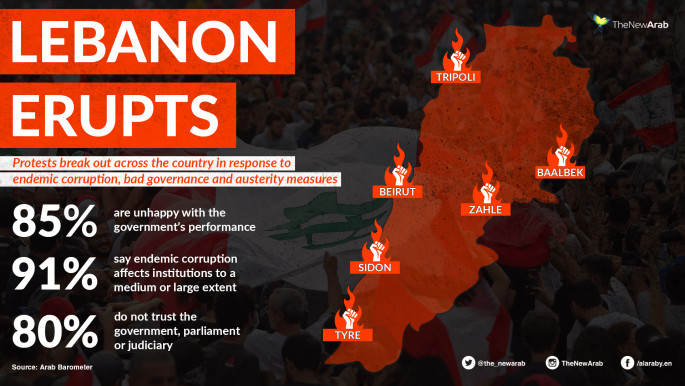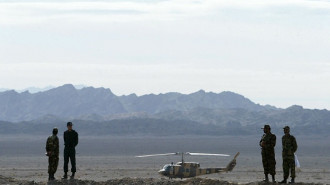Amnesty urges Lebanon authorities to protect protesters following increasing attacks
The authorities have "failed to adequately protect protesters from violent attacks by others", said a statement signed by a group of independent rights experts affiliated with the United Nations.
Signatories included Agnes Callamard, special rapporteur on extrajudicial, summary or arbitrary executions, and Michel Forst, special rapporteur on human rights defenders.
"Security forces have reportedly failed to intervene to protect peaceful protesters or arrest perpetrators on at least six occasions," they said.
London-based rights watchdog Amnesty International warned that attacks on protesters could signal a "dangerous escalation".
"The authorities must act immediately to protect protesters and uphold the right to peaceful assembly," said Lynn Maalouf, Amnesty’s Middle East research head.
Street protests demanding an overhaul of Lebanon's entire political system have rocked the small Mediterranean country since mid-October.
As its bitterly divided political leaders struggle to form a new cabinet, supporters of political factions have targeted demonstrators.
 |
On Sunday night, supporters of Lebanon's two main Shia parties - Hezbollah and Amal - briefly attacked protesters blocking a key Beirut flyover, in the most serious such confrontation since the start of protests.
At least 10 demonstrators were injured, civil defence said.
The security forces have come under fresh criticism following Sunday's attack, with protesters accusing them of being lax with Hezbollah and Amal supporters, most of whom were allowed to walk away.
"The thugs throw stones and insult security forces but they don't confront them," said Elie, 24, who was among the protesters attacked.
Read more: Nobody knows Lebanon's problems better than its women. It's time you started listening
"They don't arrest them the way they arrest us."
Such criticism prompted Interior Minister Raya al-Hasan to say the army and police remain the only "guarantors of the country's stability".
The following night, dozens of youths again taunted anti-government activists in central Beirut and the southern port city of Tyre.
On Tuesday, supporters of the Free Patriotic Movement - a Christian party founded by President Michel Aoun - confronted dozens of protesters who were calling on the head of state to schedule parliamentary consultations.
Meanwhile, Lebanon's caretaker Prime Minister Saad Hariri announced on Tuesday that he was withdrawing his candidacy for the role of prime minister.
Hariri also called on President Michel Aoun to urgently hold consultations in parliament to name a new PM, The Daily Star reported.
The outgoing prime minister tendered his government's resignation on 29 October, in response to pressure from the street.
"I am committed to the rule "not myself, but someone else," to form a new government that speaks to the aspirations of the Lebanese people", Hariri said in Tuesday's statement quoted by Lebanese media.
Demonstrators say they reject any government that would also include representatives of established political parties.
The United States, France, the World Bank, and credit rating agencies have all urged officials to accelerate cabinet formation, warning of a deteriorating economic and political crisis.
In the latest diplomatic push, senior British Foreign Office official Richard Moore was in Lebanon on Monday to meet top officials and "underline the urgent need to form a government", the British embassy said.
"The people of Lebanon have been clear in their demand for improved governance, and they should be heard," Moore was quoted as saying.

![Palestinians mourned the victims of an Israeli strike on Deir al-Balah [Getty]](/sites/default/files/styles/image_684x385/public/2024-11/GettyImages-2182362043.jpg?h=199d8c1f&itok=xSHZFbmc)


![The law could be enforced against teachers without prior notice [Getty]](/sites/default/files/styles/image_684x385/public/2178740715.jpeg?h=a5f2f23a&itok=hnqrCS4x)
 Follow the Middle East's top stories in English at The New Arab on Google News
Follow the Middle East's top stories in English at The New Arab on Google News
![Fakhrizadeh [AFP] Fakhrizadeh [AFP]](/sites/default/files/styles/image_330x185/public/media/images/774C39F7-8F7A-4D67-B998-27D102FCB4A7.png?h=d1cb525d&itok=j9eGvunV)

